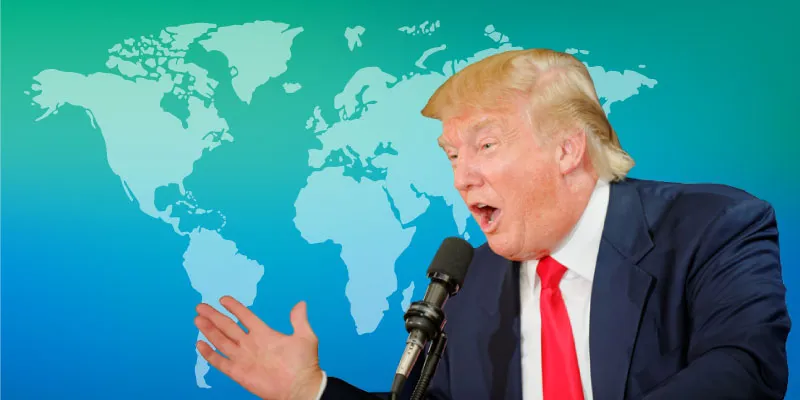History’s ‘Great Man Theory’ could explain Donald Trump’s rise, writes this Princeton professor
American history is going to be made this Friday with Donald Trump’s inauguration as the 45th President of the United States of America. While his modern day ‘coronation’ takes place on one end, protests against the same will be breaking out across the nation, as men and women launch their final attempt to change the course of their collective future.

Image credits: www.creativecommons.com
While everyone deliberates over how Trump’s Presidency will affect them (through direct or indirect consequences), we hit the pause button on the inevitable and just wonder about how and why this actually happened. How is it that the same country which proclaims itself to be the greatest champion of ‘democracy’, be the same to elect a man whose actions suggest otherwise to the most powerful seat in the world?
The answer, states Professor David A Bell, lies in history itself. A noted historian himself, Bell speaks about how Trump’s surprising ascent to power re-establishes the ‘Great Man’ theory of history. Bell draws attention to two people in the context of this theory: Adolf Hitler and Joseph Stalin.
In a self-written opinionated piece, Bell spoke about how through history, whenever an ‘anti-leader’ (in simplified terms) rises to power, it is more often than not due to the current political, social, and economic situation of the country, also known as the ‘long-term impersonal forces’, which adheres to his patronage as opposed to the personality of the ‘anti-leader’ himself. To quote him directly,
“To what extent does historical change depend on the actions of a handful of unusual individuals — history’s archetypal Great Men and Women — as opposed to large-scale, long-term, impersonal forces?”
Bell suggests that Trump’s ascent to power can be identified with a phenomenon famously referred to as ‘populism’. In this context, populism refers to “an upsurge of hostility to elites, which academics explain by reference to the changing social and cultural conditions that left a large group of white Americans economically vulnerable, fearful of outsiders, and bitterly resentful.”
What Trump has been offering his ‘native countrymen’ from the beginning of his campaign is ‘security’ against the multitude of ‘outsiders’ that have poured into their ‘sacred’ homeland over the past several decades. For lower and middle-income white Americans who have witnessed a rise in professional competition with these same ‘outsiders’, this promise from a man who swears to make ‘America great again’ will only tilt them dedicatedly in his favour.
Bell states that Trump managed to procure the votes of these individuals by striking while the iron was hot, so to speak. Looking at the global crisis across the world and America’s obvious involvement in most of it, the ordinary American has seemingly lost faith in the Democratic party-system, especially in one that was being represented by Hillary Clinton, who they feared would instigate a new era of warfare the minute she claimed the seat. Her flexible statements regarding the assimilation of immigrants and other ‘non-Americans’ also frightened them, and it was this fear or disdain towards these ‘outsider’ classes that dominated the social American condition, that Trump cleverly targeted to shift the votes towards himself.
“In the Western world, the divide looms ever greater between highly educated, wealthy, and largely secular elites and much of the rest of the population. The free movement across borders of ideas, goods, and people is seen largely as a boon by the former and largely as a threat by the latter,” says Bell.
Drawing parallels with history, one can see the impersonal forces in play that Bell speaks about so passionately. No one can deny the fact that while Hitler was a dictatorial tyrant in his own right, the reason he came to power was mainly due to the overall conditions that existed in Germany at the time. This included a weakly corrupt administrative system, a crippling economy, and a need for justice from the Allied forces. Similarly, Stalin’s rise to power was a result of the animosity and subjugation that the masses had harboured towards the Tsars for as long as they did.
At the same time, Bell professes, it would be wrong to state that the personality of the history’s archetypal ‘Great Men and Women’ have little effect on the events of the times. Hitler may have been able to procure the seat due to the conditions of a post-war Germany, but the unimaginable extent of his inhumane measures or political concoctions would possibly not be replicated by any other dictator in his stead. Similarly, Stalin’s ‘purge’ or deliberate starvation of Ukraine would again possibly not be carried out by another in his position. Winston Churchill, too, demanded that the war be carried on and the Nazis be defeated at a time when a crippling British economy had led some of the other leaders anxious to plead peace.
Coming back to the present, Trump’s arguably commendable skill to draw people’s attention and have them believe that he will truly ‘make America great again’ through whatever measures necessary is definitely a factor that won him the seat today. As Bell states, “Not only did he understand and channel their anger at the elites they believed had abandoned them; he delighted them with his utter disdain for the rules those elites allegedly enforced and that he mocked as ‘political correctness’.”
To him however, the roots to these unpredictable progressions lie in something much greater than the individual in concern. As history has proved time and again, it isn’t as much the individual as it is the power of the long-term impersonal forces to change and determine its very course.







